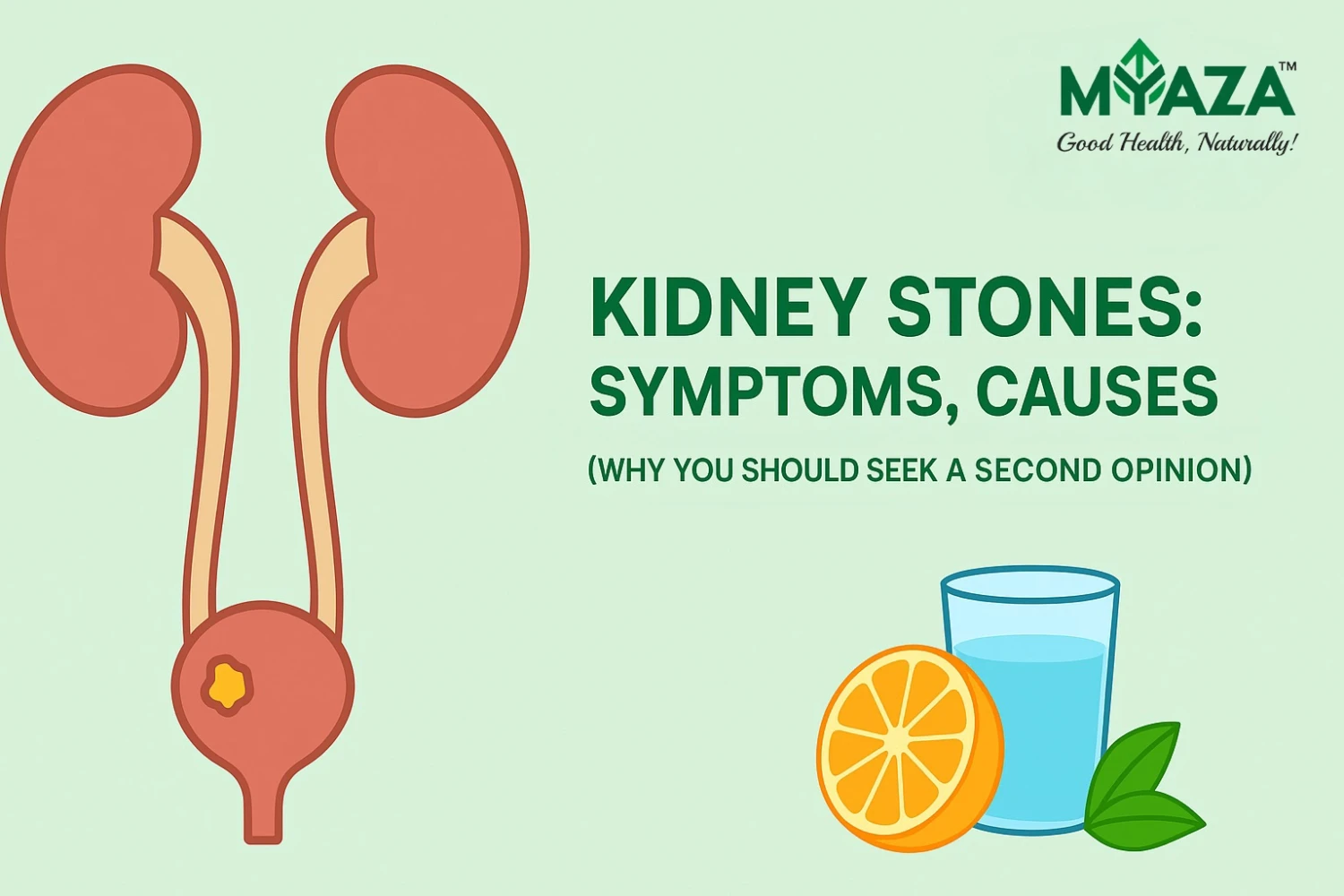Kidney Stones Care – Get a Trusted Second Opinion

Kidney Stones: Symptoms, Causes(Why You Should Seek a Second Opinion)
Kidney stones can feel like one of the most painful health experiences — sharp waves of pain, trouble passing urine, and even blood in the urine. If you’ve been diagnosed with stones and advised surgery, pause for a moment. In many cases, small stones pass naturally, and lifestyle changes or supportive care can help. Before making a big decision like surgery, it’s wise to seek a second opinion and learn about your full range of options.
In this blog, we’ll break down what kidney stones are, why they form, common symptoms, and how natural support like diet, hydration, Ayurveda, or Homeopathy can help — always alongside medical guidance.
What Are Kidney Stones?
In simple words, kidney stones are tiny hard crystals made from minerals and salts in your urine. Sometimes they stay in the kidney, other times they travel down the ureter (the tube connecting kidney to bladder).
- Very small stones may pass on their own.
- Larger or complicated stones may block urine flow and need medical attention.
According to the National Institute of Diabetes and Digestive and Kidney Diseases (NIDDK), kidney stones are becoming more common, partly due to diet and lifestyle factors.
Common Symptoms
Most people with kidney stones experience sudden and intense pain, but the signs can vary:
- Severe, wave-like pain in the lower back, side, or lower belly
- Burning or pain when passing urine
- Blood in urine (pink, red, or brown urine)
- Cloudy or foul-smelling urine
- Feeling the urge to pee often but releasing very little
- Nausea or vomiting
Red flag: If you have fever, chills, or can’t pass urine, it’s a medical emergency. (Mayo Clinic, NHS)
Why Do Kidney Stones Form?
Kidney stones form when urine becomes too concentrated, allowing minerals to crystallize. Some common risk factors include:
- Not drinking enough water
- Eating too much salt or animal protein
- Family history of stones
- Living in hot climates (more sweating, less urination)
- Certain health conditions like gout, obesity, or digestive diseases
(Source: NIDDK)
If You Were Advised Surgery — Take a Second Opinion
Surgery or procedures (like lithotripsy) may sometimes be necessary, especially for large or obstructing stones. But before agreeing to surgery, consider asking another qualified urologist:
- What is the exact size and location of the stone?
- Is it possible to wait and see if it passes naturally?
- Can hydration, pain control, and regular monitoring work instead?
- What dietary changes would help for my specific stone type?
- Can supportive therapies like Homeopathy or Ayurveda be used safely alongside medical care?
A second opinion empowers you to make confident, informed choices.
Natural & Lifestyle Support (Always With Medical Guidance)
1. Fluids First
Hydration is the most important prevention and support tool:
- Aim for 2–3 liters of fluid daily (unless your doctor restricts fluids).
- Target pale yellow urine.
- Adding citrus (like lemon water) may help reduce stone risk.
(Source: Cambridge University Hospitals)
2. Everyday Diet Tips
- Cut back salt – too much sodium increases stone risk.
- Don’t cut out calcium – normal dietary calcium helps bind oxalates and prevent stones.
- Moderate animal protein – excessive red meat or seafood raises uric acid stone risk.
- Eat more fruits, vegetables, and whole grains – natural balance supports kidney health.
For specific stone types (e.g., calcium oxalate stones), your doctor may advise tailored limits.
(Source: National Kidney Foundation)
3. Homeopathy (Supportive Option)
Some patients turn to homeopathy for relief from burning pain or overall wellness during stone episodes.
- Evidence is limited (case reports, small studies).
- Should only be used under a qualified homeopath and alongside your doctor’s care.
- Never replace urgent medical treatment with homeopathy.
4. Ayurveda (Supportive Option)
In Ayurveda, kidney stones are described as Mutrashmari. Ayurvedic support includes herbal formulations and dietary regulation:
- Herbs like Gokshura, Punarnava, Varuna, Pashanbheda are commonly prescribed.
- AYUSH/CCRAS studies suggest potential benefits, but quality varies.
- Always consult a certified Ayurvedic practitioner and keep your urologist informed.
FAQs
Q1. Can small stones pass naturally?
Yes. Stones <5 mm often pass with fluids, pain control, and monitoring. (University Hospitals Sussex)
Q2. Should I stop calcium?
No. Normal dietary calcium helps prevent stones. Don’t stop supplements or change diet without medical advice. (National Kidney Foundation)
Q3. What should I drink?
Mostly water. Aim for light-colored urine. Lemon water can help. (Cambridge University Hospitals)
Q4. Can diet really prevent stones?
Yes. Hydration, lower salt, moderate protein, and personalized advice reduce risk. (Mayo Clinic, National Kidney Foundation)
References
- NIDDK – Kidney Stones Overview
- Mayo Clinic – Symptoms & Causes
- NHS – Kidney Stones Guidance
- National Kidney Foundation – Prevention & Diet
- Cambridge University Hospitals – Dietary Advice
- University Hospitals Sussex – Patient Info
- IJRH – Homeopathy Research
- PubMed – Kidney Stones Research
- CCRAS / AYUSH Research
- PMC – Ayurveda Studies
Final Takeaway
Kidney stones are painful but often manageable without surgery. If advised surgery, it’s wise to get a second opinion — especially for small or uncomplicated stones. In the meantime, hydration, diet adjustments, and supportive care from Ayurveda or Homeopathy (under expert guidance) can play a role in prevention and comfort.
Remember: Severe pain, fever, vomiting, or inability to pass urine = seek urgent medical care immediately.



